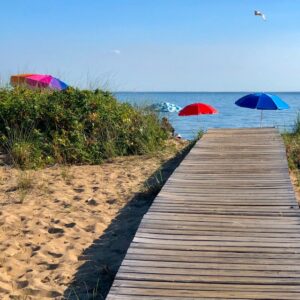
Fall—the air gets crisper, the days shorter, we finish up projects started in the spring and prepare for new ones. We harvest the fruits of summer’s heat—apples and mums, pumpkins and corn. It is time to let go of long summer days, open windows, vacations, cookouts and swims in the sea.
One compelling nuance of Chinese Medicine is the awareness of the connection between the seasons and our organ systems, emotions and spirit. The lungs, which is the organ that predominates in autumn, must be healthy in order to protect the body from colds and flu, allergies, asthma, bronchitis and decreased immune function. Each organ has an associated emotion and the lung is connected with sadness and grief. Sadness that has run well past its normal course can weaken the lungs, and unacknowledged or suppressed grief will interrupt its normal function. Like all of the other emotions, a Chinese Medical perspective gives us a different, more expansive and even poetic view of sadness, letting go, and grief. The process of grief is closely tied to a sense of precious beauty and completion—whether we are dealing with the end of a loved one’s life, the season of summer or perhaps a job, relationship or dwelling we had our heart set on. It makes us return our focus to what we do have. Lao Tzu, the famous Chinese philosopher writes, “Only in losing do we gain.”
A good practitioner of Chinese Medicine will strengthen the lungs with a variety of techniques. Needling a point on the inner side of the arm about two inches above the wrist can help to release constrained emotions. Specific points on the back help to strengthen lung function. Cupping (remember those dark purple spots on Michael Phelps during the Olympics?) removes dampness. Burning the herb mung wort (moxa) over certain parts of the body can strengthen lung function. It is best for someone who is prone to colds, flu and allergies to have these issues addressed with treatments in the spring and summer before the fall and winter when they become more vulnerable. In ancient China it was the physician’s job to keep their patients healthy. When a patient became sick and died a lantern was hung outside the doctor’s door to let the village know.
Chinese Medicine, different in approach from the Western Medical perspective of disease and its treatment, is neither better nor worse. The two work well together and often complement the others way of restoring health. I like to think of Eastern Medicine as integrative rather than alternative. As I have said before, it is most likely the oldest and most widely used medicine in the world. The body of knowledge from which it is derived is thousands of years old and vast. The fact that it is practiced in just about every New York City hospital today is very good news. It means we have the beginning of a dialogue which will eventually result in a much-needed improvement to our mainstream health-care system. I am sure, especially in these times, many will agree that this is a good thing, indeed.
Follow me on Instragram: @mgacupuncture and @maureengossphotography







Leave a Reply